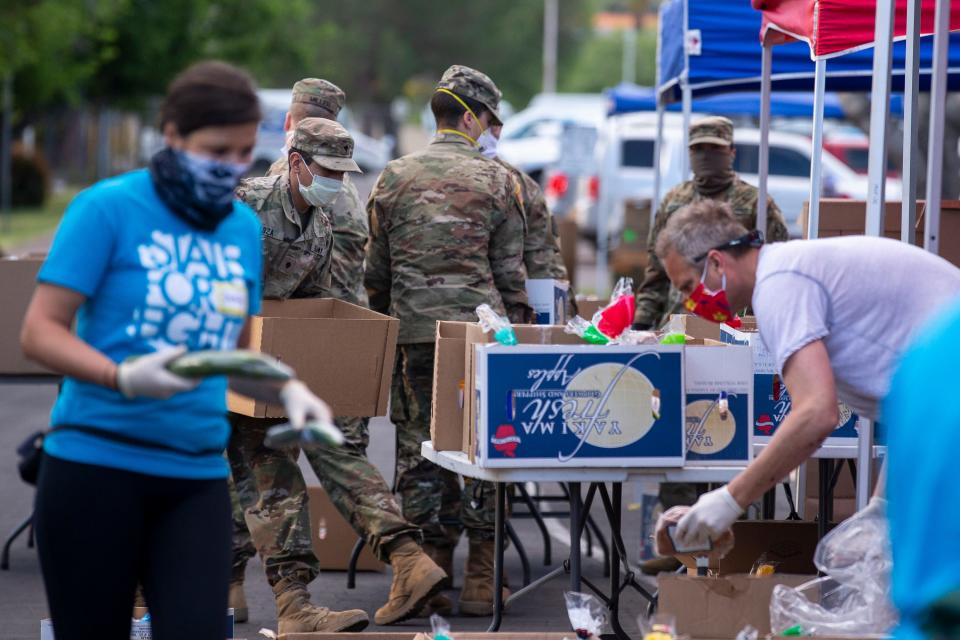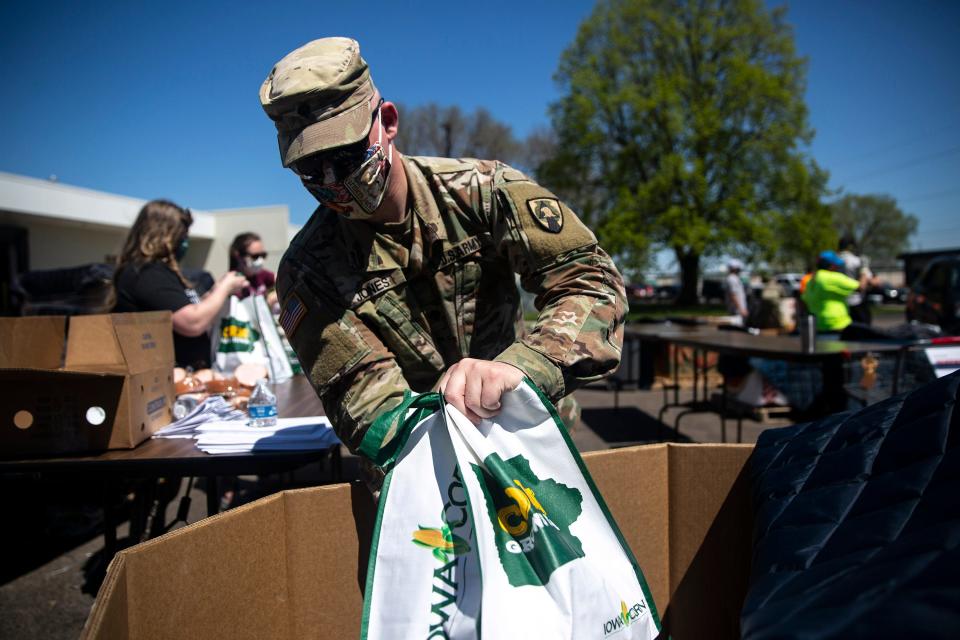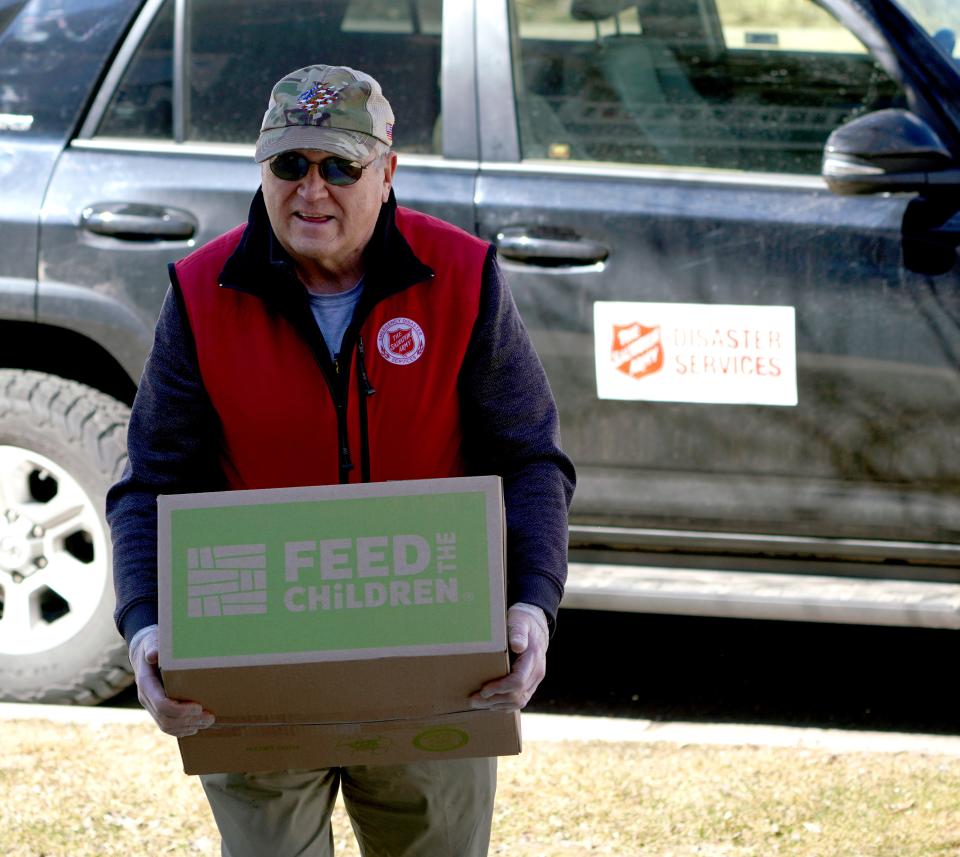‘This is not the time to do nothing’: Volunteers risk illness to deliver food to the needy
As the global pandemic took hold in the United States, food insecurity spread along with the coronavirus.
People who have long struggled to get enough to eat have been joined by people who suddenly lost their jobs as the economy crumbled or who cannot get food from their usual sources.
Across the country, Americans have stepped up to try to help. Read the tales of those who answered the call to take their part in America's Food Chain.
Peanut butter and temperature checks
MESA, Arizona

Wendy Bader was supposed to start a part-time job and had an interview scheduled for a full-time position. But all that was put on hold as the global pandemic spread.
Instead, in mid-April she stood in a circle with a dozen other volunteers, getting instructions on how they would spend the next few hours filling 1,200 emergency food bags. They all kept a safe distance from one another.
Before the volunteers could start, a food bank employee held a digital thermometer to their temples to make sure no one had a fever. They were then pointed to a hand-washing station and issued face masks and gloves.
Once she was cleared, Bader filled plastic bags with canned vegetables, meat and peanut butter at a United Food Bank warehouse in Mesa. The bags would then be delivered to 220 food pantries and agencies across the Phoenix metro area to distribute to families in need.

Bader has been a longtime donor to the food bank, but when the COVID-19 crisis erupted, she knew she had to do more.
"In 2008, I lost my job," she says. "I've lived that. I know what kind of need is out there. ... After all that's happened, I thought what can I do, and I jumped at the opportunity."
At food bank, volunteers put themselves on the line between virus and hunger
— John D'Anna, Arizona Republic
Soldiers passing out frozen mashed potatoes
DES MOINES, Iowa

On April 30, about 30 members of the Iowa National Guard assisted volunteers and staff at the Food Bank of Iowa in distributing more than 95,000 pounds of food.
Dozens of cars filed into a nearby parking lot, their windshields tagged with green tape to identify their drivers as meal recipients.
Des Moines resident Anthony Calvache sat in the parking lot on his lunch break to pick up a meal for his sister and mother. He is still employed, but his sister was recently laid off, he said.
"All of this is helping us out," he said.
In groups of 16, cars were released from the lot so as not to overwhelm staff at the food bank. Throughout the day, the line out of the food bank parking lot and into the street stretched to more than two dozen cars.
Soldiers stood in the sun for more than six hours, directing traffic and packing and distributing food bundled in bags made from donated T-shirts. The meals included liquid eggs, frozen mashed potatoes and peaches, ham and popcorn chicken.

Dylan Lampe, director of donor engagement for the food bank, said enough food was distributed to feed more than 5,000 Iowans.
Along with packing up food, the Iowa National Guard was involved in planning the meal distribution. Iowa National Guard Sgt. David Bowman said soldiers traveled around the state dropping off and delivering food supplies at several sites.
'It’s something great to be able to help our community and show what the guard is capable of," he said. "We’re not just a military force, we’re a community force as well – to help out the community when in need."
Photo gallery: Iowa National Guard helps distribute food at Food Bank of Iowa
— Sarah LeBlanc, Des Moines Register
‘It’s every man for himself right now’
LOS ANGELES, California

About 7 a.m. on a morning in late April, Shirley Raines, 52, walked up to the drive-thru window at the McDonald’s on 7th and Alameda streets near downtown Los Angeles to pick up her order: 600 burgers to feed the people who make their home along the streets of nearby Skid Row.
Raines, an Instagram beauty influencer and founder of homegrown nonprofit Beauty2thestreetz, which offers homeless Angelenos hygiene kits and hot meals with a side of free services like haircuts, wore gloves and a mask to distribute food throughout the downtown Los Angeles neighborhood where nearly 5,000 people live in tents and tarp-covered boxes on sidewalks.
“It’s every man for himself right now in Skid Row,” she said. “So it’s to the greater good that we go down here and make sure we try to give them some sense of protection. Even if it’s just hand sanitizer, even if it’s just a face mask and gloves, even if it’s just oranges. We’re just trying to make sure they’re taken care of.”
Her car was packed from the floor mats to the roof with the blankets, hand sanitizer, fruit and Vitamin C packs that she and her team of volunteers were going to pass out.
“I made a vow,” she said. “I’m married to the game. I’m married to the streets. What kind of spouse walks away when things are rough?”
— Harrison Hill, USA TODAY
‘This is not the time to do nothing’
AVON, Colorado

Huffing a bit, Mike Williams, 75, hauled the box of food up the apartment stairs, stacking it atop another already sitting outside the door. Dan Smith, 73, followed close behind, an identical box resting against his red Salvation Army jacket.
The boxes began piling up as the two volunteers made another trip up the stairs on that March day, their steps getting a little slower each time. Both men are squarely in the most dangerous category for COVID-19 infections: older, with pre-existing health conditions. Their concern, however, was focused on the family behind the door, eight of their neighbors who were waiting out a coronavirus quarantine mandated by county health officials.
"Everyone has their own risk-benefit calculation," Smith said. "I've made my calculation. You've got plenty of time to do nothing when that first shovel of dirt hits your face. This is not the time to do nothing."
At the Salvation Army's food bank in Avon, demand nearly doubled in March after Colorado Gov. Jared Polis ordered ski areas to close at the height of the spring break season, followed by sit-down restaurants and retail stores. Avon had been hit so hard by coronavirus infections that public health officials specifically told anyone who's been there to quarantine themselves for 14 days.

Private donors poured resources into the local food bank. Some people drove up to donate a box of food. Vail Resorts worked on emptying its ski-area restaurant freezers into the food bank's storage. An anonymous private donor gave $20,000 to provide Feed the Children meal boxes, which Smith, Williams and other volunteers delivered daily.
On their delivery route, Smith and Williams banged on the apartment door and hustled back down the stairs. They were not supposed to have any contact with the people they're serving.
"Turn around," Williams yelled up to the woman who opened the door. "Behind you."
SUBSCRIBE: Help support quality journalism like this.
The woman turned to see the boxes, and her mouth split into a huge smile. "Thank you," she said. "Thank you."
Inside the apartment, Itzel Villa, 11, watched as her family eagerly opened the boxes, pulling out cans of tuna, rolls of toilet paper and bags of broccoli. There was also shampoo. Lotion. Corn Flakes. Everything necessary for another week of confinement.
"We are safe and we are happy," Villa said, translating on behalf of her extended family. "Thank you so much."
— Trevor Hughes, USA TODAY
‘I can’t fight what I can’t see’
NASHVILLE, Tennessee

Jennifer Clinger is tough. She survived abuse, decades of sex trafficking and a heroin addiction.
But COVID-19? That terrifies her.
"I'm really frightened to go out there right now," Clinger said in mid-April, choking up on the phone in her Sylvan Heights apartment, "because I can't fight what I can't see."
Clinger is a graduate and employee at Thistle Farms, a two-year recovery program for women survivors of addiction and trafficking.
During the pandemic, Thistle Farms' founder, the Rev. Becca Stevens, dispatched her singer/songwriter son, Levi Hummon, 28, to deliver packages of food, toiletries and pet supplies for the 30 current Thistle Farms participants and for many of the more than 200 alumni and staff members sheltering at home.
Stevens, 57, said many women in the Thistle Farms community have underlying medical conditions brought on by years of abuse. Most also have post traumatic stress that could make them uncomfortable leaving their homes.

So the supplies have come to them. One box contained peanuts crackers, canned tuna, feminine hygiene products, candy canes, soap, peanut butter, toilet paper, almonds and cleaning products.
Bobbie Smith, 40, who completed the Thistle Farms program last year, could not find dog food at local stores for her pup Mason, which was donated to help with her PTSD.
"Then Levi called and said, 'Where should I drop the dog food and groceries at?'" Smith said. "It was the first time I’ve cried tears of joy in a long time."
COVID-19 lockdown: Women's recovery program takes care of its own with porch deliveries
— Brad Schmitt, The Tennessean
America’s Food Chain: Who feeds the nation during the COVID-19 pandemic?
As many of us across America have hunkered down in our homes under safer-at-home orders, someone else has had to venture out day after day to keep the country fed.
To get the food from the farm to our tables, they continue to work – sometimes without the protections we’re told are crucial to guard against the coronavirus – to pick the oranges, slaughter the pigs, truck the goods and cook the food, so America can continue to eat.
Through an occasional series of intimate portraits in the coming weeks, USA TODAY Network journalists are shining a light on their lives and work.
SUBSCRIBE: Help support quality journalism like this.
This article originally appeared on USA TODAY NETWORK: Coronavirus: Food bank volunteers risk illness to battle hunger
